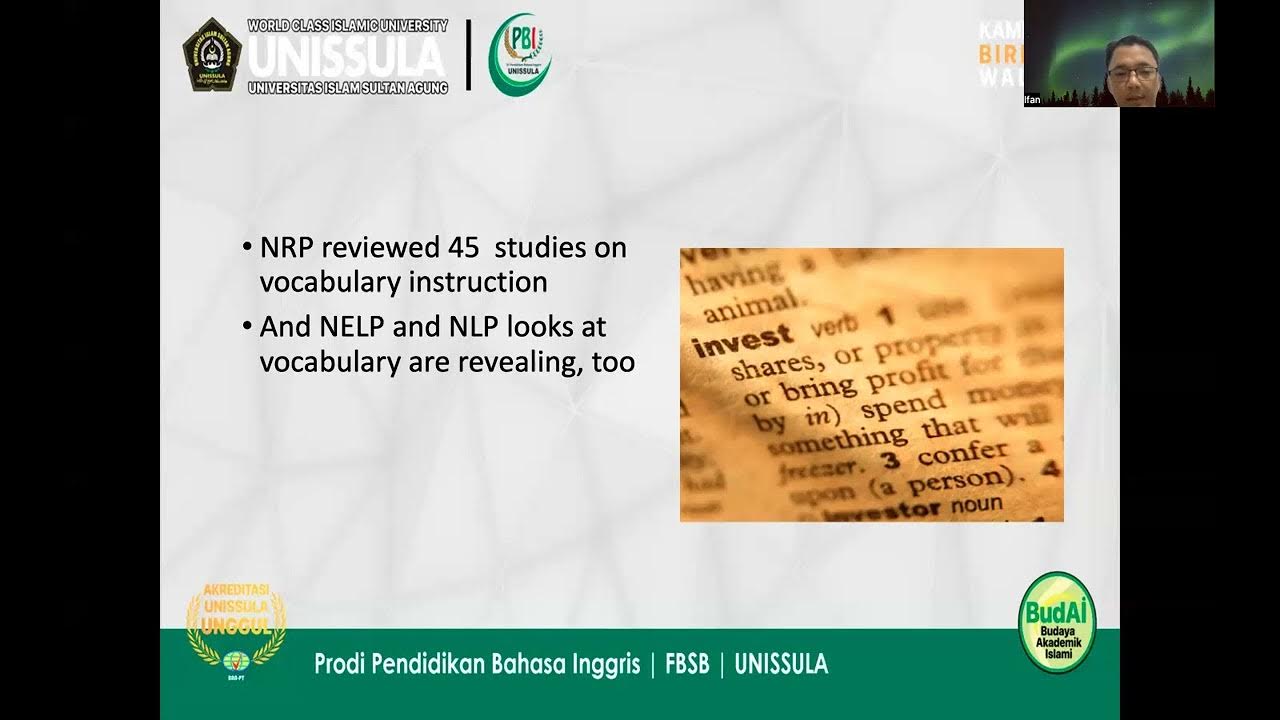David Crystal - Should English be taught as a 'global' language?
Summary
TLDRThis video discusses the impact of Global English on English language teaching, emphasizing its role in comprehension (listening and reading). It argues that students must be exposed to a diverse range of English accents and dialects to be truly prepared for real-world communication. While comprehension must evolve to reflect global variation, production (speaking and grammar) remains largely focused on standardized English, such as RP or Standard British English. The video advocates for broadening comprehension teaching while maintaining a consistent approach for language production.
Takeaways
- 😀 Global English is becoming increasingly important in English language teaching, especially in preparing students for real-world encounters with diverse English accents.
- 😀 The key focus of Global English in language education is comprehension—specifically listening and reading skills—rather than production (speaking and writing).
- 😀 Students should be exposed to a wide variety of non-standard English accents and dialects to improve listening comprehension.
- 😀 Teachers need to challenge the traditional view that Received Pronunciation (RP) or British Standard English is the only valid form of English.
- 😀 In real-life situations, students will encounter multiple accents and dialects, even within a single city like London, making it essential to diversify comprehension teaching.
- 😀 Exposing students to a variety of global accents helps them understand the real linguistic diversity they will face in English-speaking environments.
- 😀 Global English doesn’t change the need for standard forms of production, such as RP or General American, which remain the focus of pronunciation and grammar teaching.
- 😀 While vocabulary is open-ended and hard to control, pronunciation and grammar require teachers to expose students to various forms of English for better adaptability.
- 😀 It is important for students to become familiar with the range of English varieties, even if they cannot master them all.
- 😀 For reading comprehension, students should engage with texts from around the world, including different English dialects in newspapers, journals, and websites.
- 😀 Despite the rise of global English, traditional models of production teaching (RP, British Standard English) remain unchanged for exams and formal contexts.
Q & A
What is the main argument of the speaker regarding Global English and language teaching?
-The speaker argues that Global English should be incorporated into language teaching, especially in terms of comprehension. While production may remain focused on standard English, students must be exposed to a wide variety of accents and dialects to better understand the global diversity of English.
How does Global English impact listening comprehension?
-Global English significantly impacts listening comprehension by exposing students to a range of non-standard accents and dialects. The speaker stresses that students should be familiar with accents beyond Received Pronunciation (RP) and standard British English to understand real-world English usage.
Why does the speaker believe it’s important for students to encounter different accents in the classroom?
-The speaker believes it’s important because students may be shocked to find that English spoken in the real world, even in cities like London, differs greatly from the RP they learn in class. Exposure to various accents helps students better understand English as it is spoken globally.
What does the speaker mean by 'non-standard variations' of English?
-Non-standard variations refer to accents and dialects of English that differ from the RP or standard versions typically taught in classrooms. These include regional dialects and accents influenced by other languages and cultures.
How does Global English affect reading comprehension?
-Global English impacts reading comprehension by encouraging students to read a diverse range of written materials from across the world. This broad exposure helps them understand the various ways English is used in different contexts, beyond just standard forms.
Does Global English change the approach to teaching English production (speaking and writing)?
-No, Global English does not change the approach to teaching production. The speaker suggests that teaching pronunciation and grammar still largely revolves around standard English forms like RP, and production remains focused on one accent and dialect.
Why does the speaker believe that students should be exposed to different English accents early on?
-The speaker believes early exposure to different accents helps students become more adaptable and familiar with the range of English they will encounter in the real world, reducing surprises or challenges later on.
How do accents from different countries influence English pronunciation and grammar?
-Accents from different countries influence English pronunciation by adding unique phonetic characteristics to the language. Grammar may also vary slightly in different English-speaking regions, although the speaker suggests vocabulary is more open-ended and less of a concern.
What is the main concern when students learn only RP or standard British English?
-The main concern is that students may develop unrealistic expectations about the English they will encounter in the real world. They might struggle to understand or communicate with speakers who use other dialects or accents.
What does the speaker suggest regarding the variety of English materials students should be exposed to?
-The speaker suggests that students should be exposed to a wide range of English materials, such as newspapers, journals, and websites from all over the world, to develop a broader understanding of how English is used in different contexts.
Outlines

This section is available to paid users only. Please upgrade to access this part.
Upgrade NowMindmap

This section is available to paid users only. Please upgrade to access this part.
Upgrade NowKeywords

This section is available to paid users only. Please upgrade to access this part.
Upgrade NowHighlights

This section is available to paid users only. Please upgrade to access this part.
Upgrade NowTranscripts

This section is available to paid users only. Please upgrade to access this part.
Upgrade NowBrowse More Related Video

ELT | English Language Teaching Methods and Approaches | Language Pedagogy | Teaching English #ylt

Strategi Lancar BAHASA INGGRIS (pengalaman, tips, jawab trouble kalian, effective learning etc.)

Inglês - Aula 1 - Língua inglesa e comunicação

TEAL_6 Teaching Reading

Informal Theatre and Creative Drama

Mindfulness for Improved English Communication and Language Learning
5.0 / 5 (0 votes)